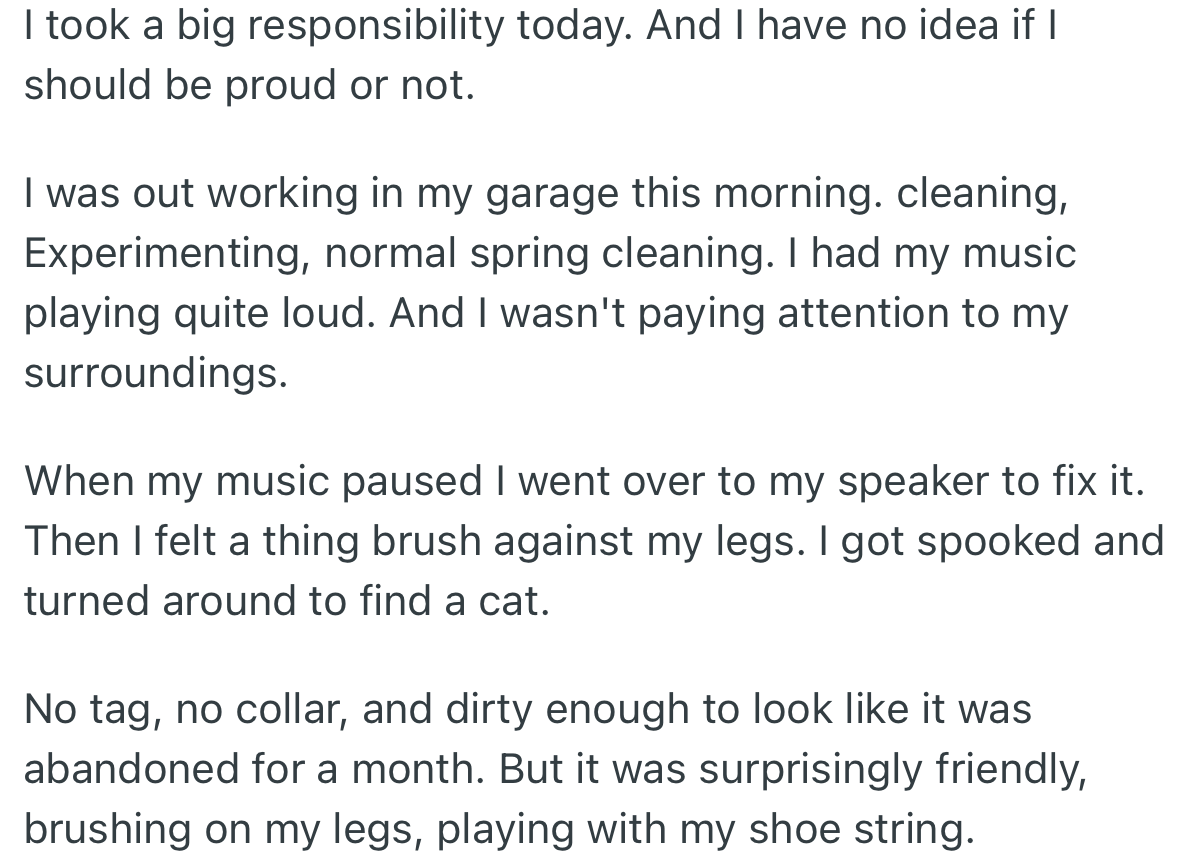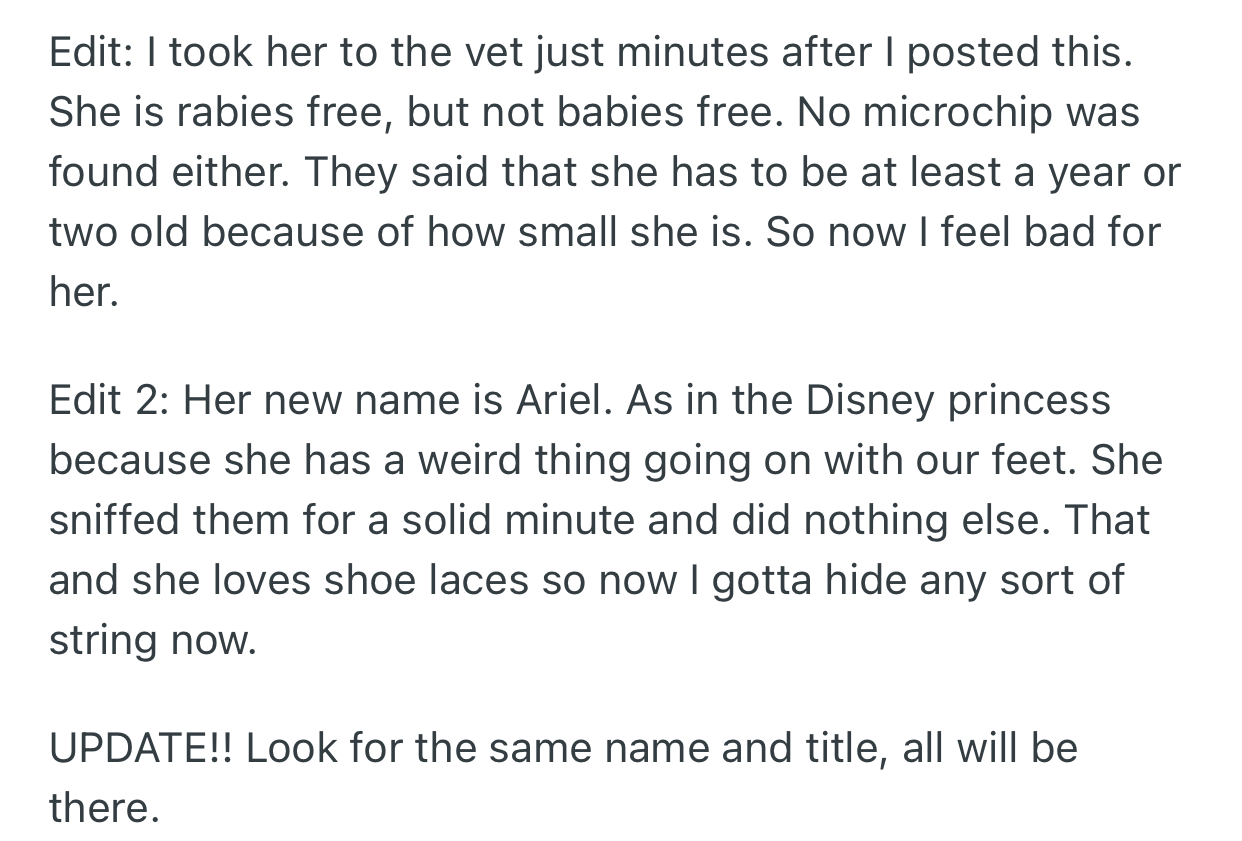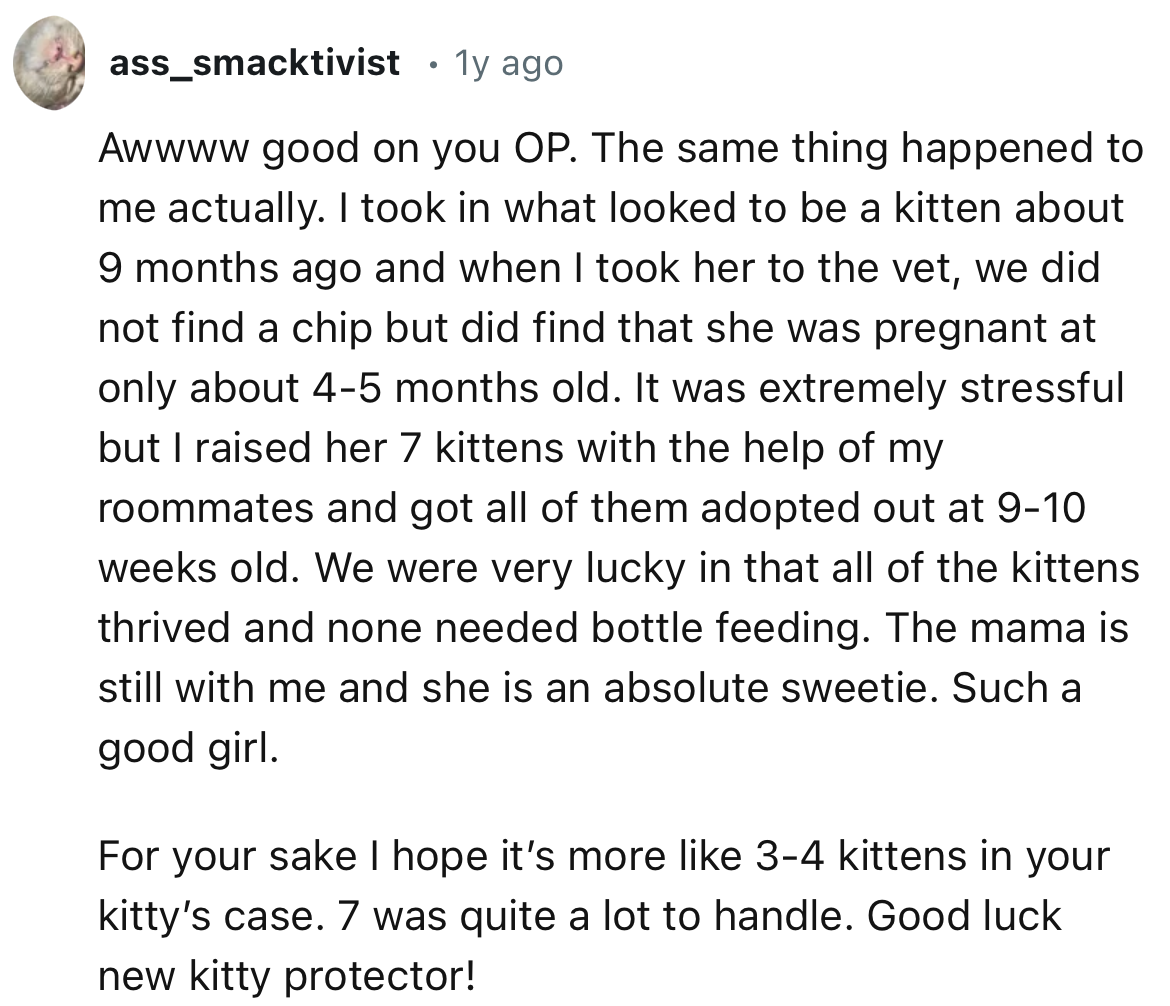Neighborhood Hero Receives Surprise of a Lifetime After Discovering Their Rescued Stray Kitty Is a Soon-to-Be Mom
Today, our narrator (Original Poster) embarked on an unexpected adventure that left them questioning their sanity. Was it a stroke of brilliance or sheer lunacy? You be the judge.
It all started on a typical spring morning. OP was knee-deep in garage clutter, blaring music to keep their spirits high while battling dust bunnies and misplaced tools.
They were lost in their own world when the music abruptly stopped, putting a dent in their flow. OP marched over to the speaker, slightly irritated, only to feel something soft brush against their legs.
They quickly spun around, heart racing, and found an adorable feline gazing up at them with the most pitiful, dirt-smudged face. This cat had no collar, no tag, and looked like it had been on a month-long survival mission.
Yet, despite its unkempt appearance, it was surprisingly friendly. OP’s initial concern for its well-being quickly turned into action.
They scooped up the little furball and brought it inside, then took a picture and posted it online, hoping to determine if it was someone’s missing pet. No leads.
Then, the plot thickened. They felt a strong kick from the cat’s belly—turns out, she was pregnant! Taking her to a shelter was no longer an option, so it looked like OP had just adopted a soon-to-be mom.
A vet visit confirmed what OP already suspected—this tiny cat was about to make them a grandparent. Could they have possibly bitten off more than they could chew? Perhaps. But it was going to be the adventure of a lifetime.
The Story in Detail

OP was cleaning his garage and had music playing loudly. Suddenly, the music stopped, and as he went over to check it out, he found a surprisingly friendly cat.

The Emotional Impact of Animal Rescue
Rescuing animals can be a deeply emotional experience, often leading to feelings of fulfillment and purpose.
Research from the Journal of Positive Psychology indicates that helping others, including animals, can enhance overall well-being and life satisfaction.
Engaging in altruistic behaviors taps into our innate desire to contribute positively to the world, which can lead to a sense of belonging and connection.
Understanding these emotional benefits can inspire more individuals to get involved in animal rescue efforts.
OP felt concerned about how the cat looked and posted a picture of the cat to determine the owner.

Shockingly, OP received no replies about the owner, except for comments on how cute the cat was. Surprisingly, he discovered the cat was pregnant and decided to keep her instead of sending her to a shelter.

Moreover, the joy of discovering a rescued animal's potential can be a transformative experience for both the animal and the rescuer.
Studies show that forming bonds with rescued animals can lead to increased empathy and emotional intelligence in individuals.
Encouraging stories of successful rescues can highlight the positive outcomes of these relationships, motivating others to participate in similar efforts.
Creating an environment that celebrates these connections can foster a culture of compassion and care.
OP took the cat to the vet and found out she was healthy. In addition, the adorable cat will now be called Ariel.

We gathered some interesting comments from netizens below:

The Role of Community in Animal Welfare
Community involvement is crucial in promoting animal welfare and supporting rescue efforts.
Research from the University of Toronto emphasizes the importance of collective action in addressing issues related to animal rescue.
Building networks of support can enhance the effectiveness of rescue operations and create a sense of shared responsibility.
Encouraging community engagement can lead to more successful rescue initiatives and foster a culture of compassion.
“I have a feeling you have just been adopted. Cats know when they have found a good human.”

“Kittens are one of the best things in the world, in my opinion, especially newborn mews and baby purring.”

Additionally, the responsibilities of animal rescue extend beyond the initial act of saving a life.
Psychologists emphasize the need for ongoing support and resources for both the rescued animals and their new owners.
Providing education on proper care and behavioral management can enhance the chances of successful placements and reduce the likelihood of rehoming.
Creating resources for new pet owners can help ensure long-term success in animal welfare efforts.
“It's actually relatively common for pregnant cats to cozy up to a friendly human. They aren't dumb; they know we have food and warm, dry homes!”

“You got adopted. Congratulations on your new owner cat and her soon-to-be beans.”

Naming her was easy. OP called her Ariel after the Disney princess. Why? Well, she had an inexplicable fascination with feet and shoelaces, which was both adorable and slightly perplexing—they had to hide every string in the house to keep her out of trouble.
Now, there they were with a pregnant cat named Ariel after making the most insane decision on a whim. But seeing her contentedly purring on the couch, OP couldn’t help but feel like they did the right thing.
We’d love to get your thoughts on this story. Join the conversation in the comments.
“I hope it’s more like 3-4 kittens in your kitty’s case. Seven was quite a lot to handle.”

“Good luck, OP, with your new little family. Rescue kitties are the best!”

Psychological Analysis
This article highlights the emotional rewards of animal rescue and the importance of community involvement.
Understanding the impact of altruistic behavior can encourage more individuals to participate in animal welfare efforts.
Creating a supportive environment for rescued animals and their new owners is essential for ensuring their long-term success.
Analysis generated by AI
Analysis & Alternative Approaches
Engaging in animal rescue efforts can lead to profound emotional benefits for both individuals and animals.
By fostering community involvement and providing ongoing support, we can enhance the effectiveness of rescue initiatives and promote a culture of compassion.
Ultimately, understanding the emotional impact of these efforts can inspire more people to contribute to animal welfare.



